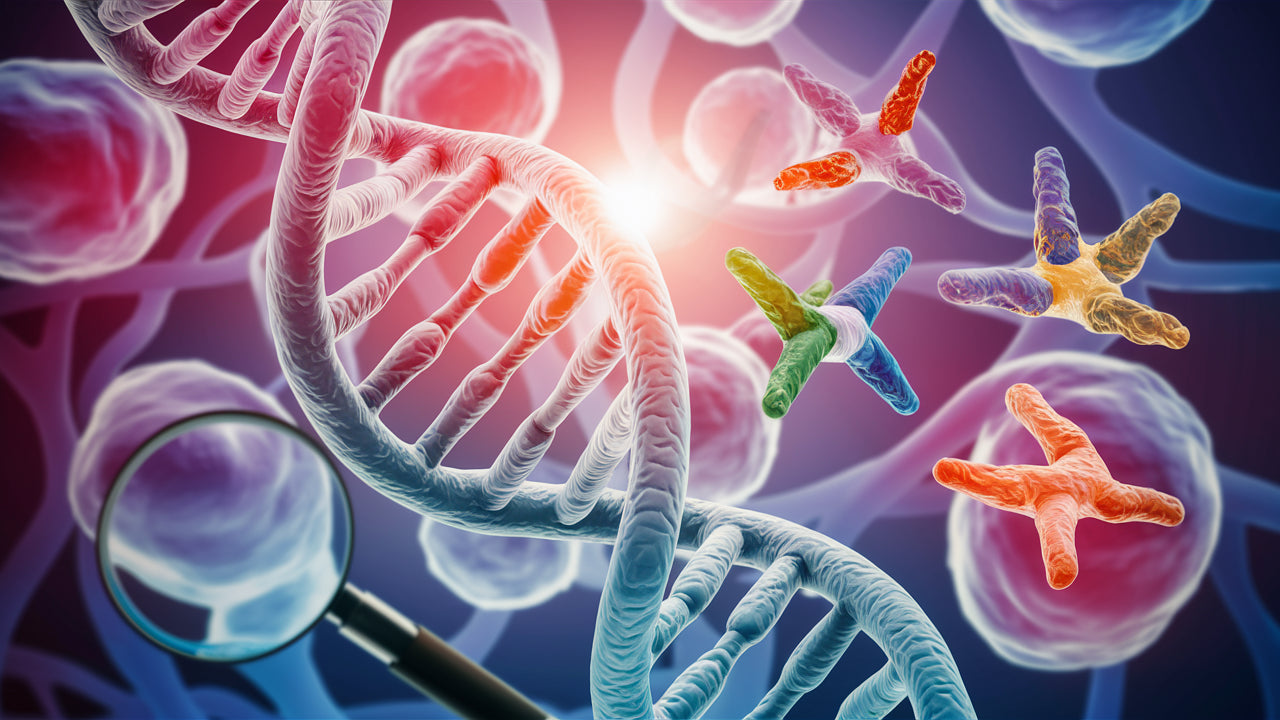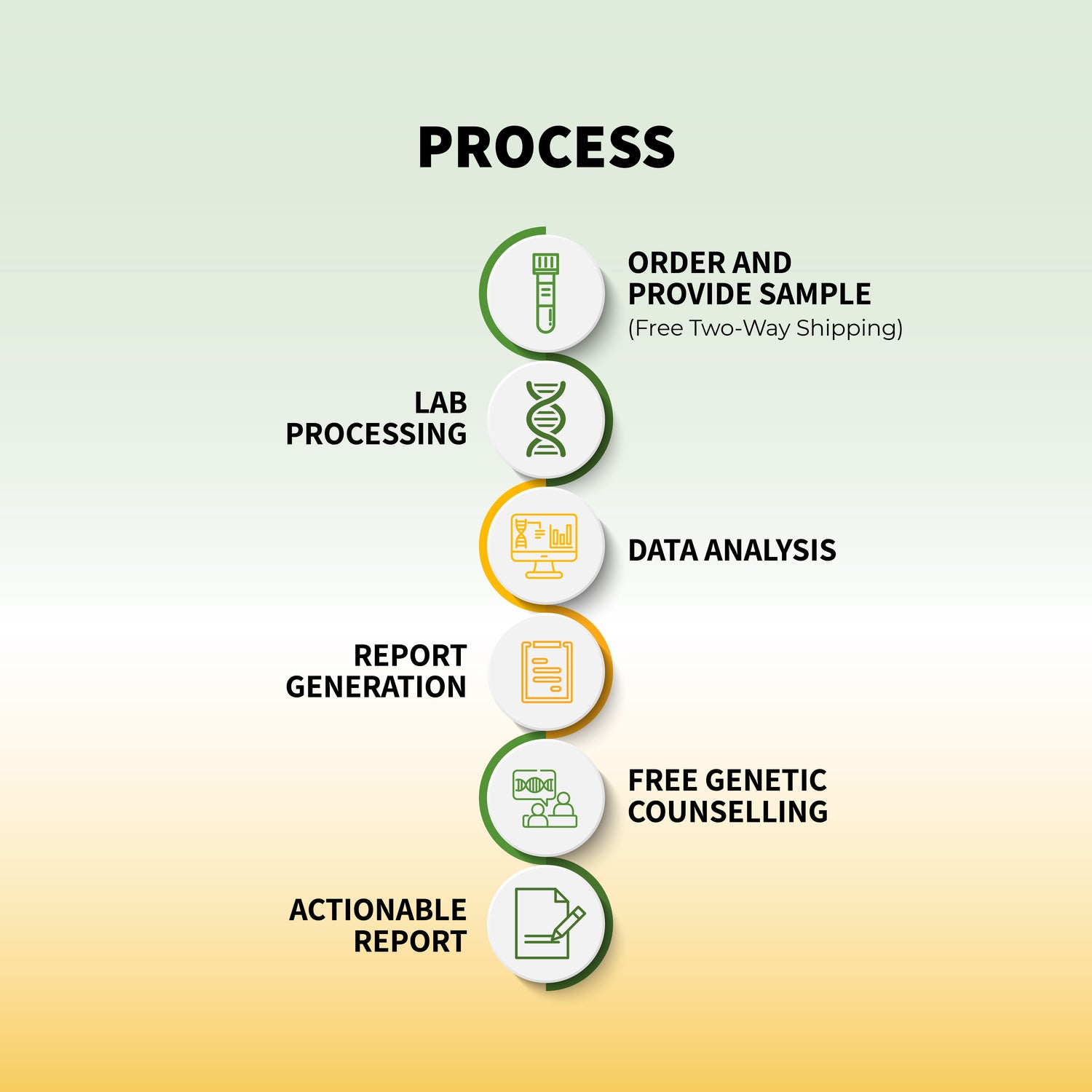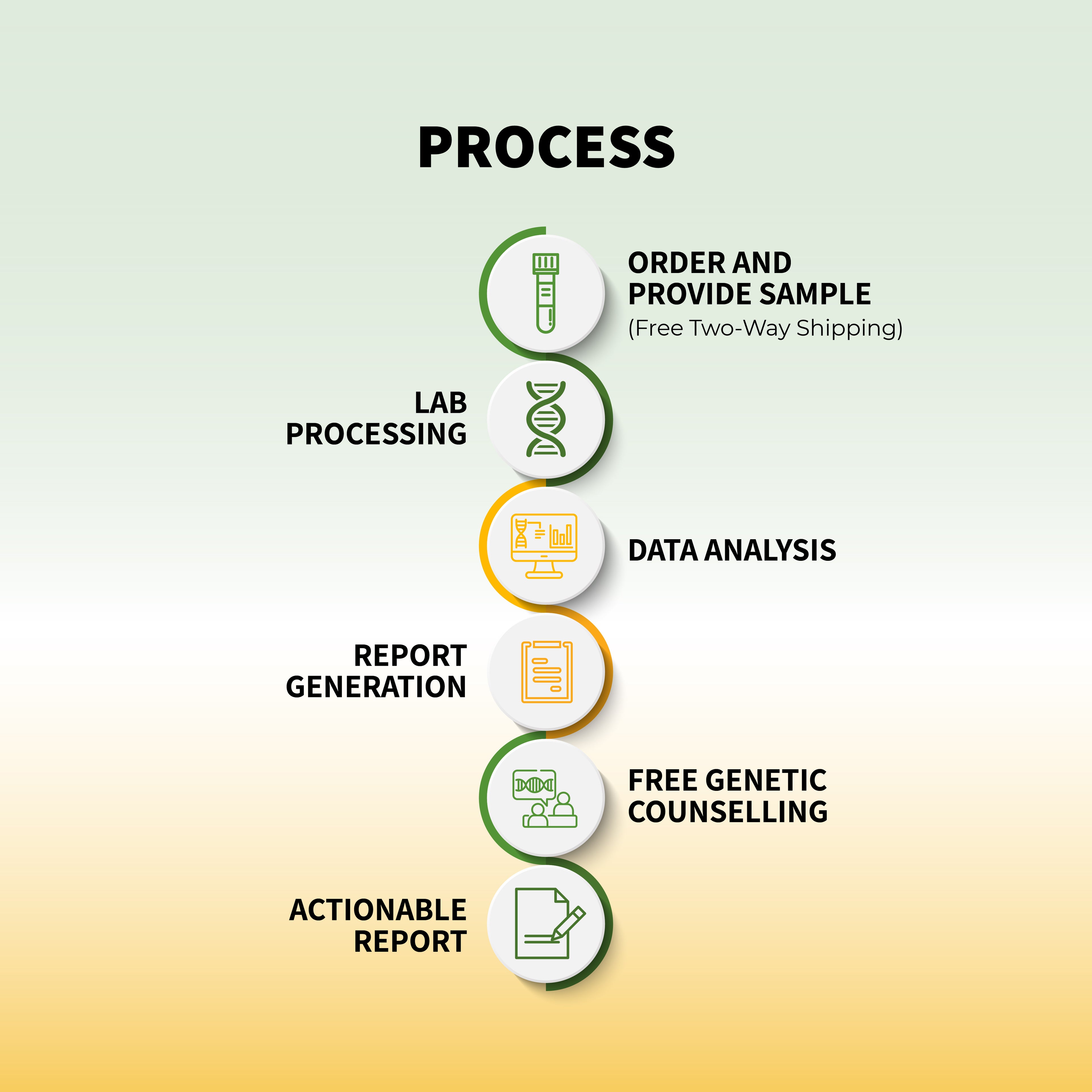आनुवंशिक विकार किसी व्यक्ति के डीएनए में असामान्यताओं के कारण होने वाली स्थितियाँ हैं। ये असामान्यताएँ एक जीन में एक छोटे से उत्परिवर्तन से लेकर पूरे गुणसूत्रों के जोड़ या घटाव तक हो सकती हैं। आनुवंशिक विकार किसी भी व्यक्ति को प्रभावित कर सकते हैं, चाहे उसकी उम्र, लिंग या जातीयता कुछ भी हो, और वे हल्के से लेकर गंभीर स्वास्थ्य समस्याओं तक, विभिन्न तरीकों से प्रकट हो सकते हैं। आनुवंशिक परीक्षण में प्रगति के साथ, आनुवंशिक विकारों का शीघ्र पता लगाना और उनका प्रबंधन अधिक सुलभ हो गया है, जिससे व्यक्ति अपने स्वास्थ्य के बारे में सूचित निर्णय ले सकते हैं।
आनुवंशिक विकार क्या हैं?
आनुवंशिक विकार वे रोग हैं जो डीएनए अनुक्रम में परिवर्तन के परिणामस्वरूप होते हैं। हमारा डीएनए, जो जीन से बना होता है, हमारे शरीर के कार्यों के लिए ब्लूप्रिंट का काम करता है। जब किसी जीन में कोई परिवर्तन या उत्परिवर्तन होता है, तो यह सामान्य शारीरिक कार्यों को बाधित कर सकता है, जिससे आनुवंशिक विकार हो सकता है। ये उत्परिवर्तन एक या दोनों माता-पिता से विरासत में मिल सकते हैं या स्वतः ही हो सकते हैं।
आनुवंशिक विकारों के प्रकार
आनुवंशिक विकार कई प्रकार के होते हैं, जिनमें से प्रत्येक शरीर को अलग-अलग तरीके से प्रभावित करता है। यहाँ सबसे आम श्रेणियाँ दी गई हैं:
-
एकल-जीन विकार: एकल-जीन विकार, जिन्हें मोनोजेनिक विकार भी कहा जाता है, एकल जीन में उत्परिवर्तन के कारण होते हैं। उदाहरणों में सिस्टिक फाइब्रोसिस, सिकल सेल एनीमिया और हंटिंगटन रोग शामिल हैं। ये विकार अक्सर एक पूर्वानुमानित पैटर्न में विरासत में मिलते हैं, जैसे कि ऑटोसोमल डोमिनेंट, ऑटोसोमल रिसेसिव या एक्स-लिंक्ड इनहेरिटेंस।
-
गुणसूत्र संबंधी विकार: गुणसूत्र संबंधी विकार तब होते हैं जब पूरे गुणसूत्रों या गुणसूत्रों के कुछ हिस्सों में संरचनात्मक परिवर्तन या असामान्यताएं होती हैं। उदाहरण के लिए, डाउन सिंड्रोम गुणसूत्र 21 की एक अतिरिक्त प्रति के कारण होता है। अन्य उदाहरणों में टर्नर सिंड्रोम और क्लाइनफेल्टर सिंड्रोम शामिल हैं। गुणसूत्र संबंधी विकारों के परिणामस्वरूप विकास संबंधी देरी, शारीरिक विकलांगता और अन्य स्वास्थ्य संबंधी समस्याएं हो सकती हैं।
-
जटिल विकार: जटिल या बहुक्रियात्मक विकार आनुवंशिक और पर्यावरणीय कारकों के संयोजन से उत्पन्न होते हैं। इन विकारों का पूर्वानुमान लगाना अक्सर अधिक कठिन होता है और ये जीवनशैली, आहार और अन्य बाहरी कारकों से प्रभावित हो सकते हैं। आम जटिल विकारों में हृदय रोग, मधुमेह और कुछ प्रकार के कैंसर शामिल हैं। जबकि आनुवंशिकी एक भूमिका निभाती है, ये स्थितियाँ किसी एक आनुवंशिक उत्परिवर्तन के कारण नहीं होती हैं।
-
माइटोकॉन्ड्रियल विकार: माइटोकॉन्ड्रियल विकार माइटोकॉन्ड्रिया के डीएनए में उत्परिवर्तन के कारण होते हैं, जो कोशिकाओं के भीतर ऊर्जा-उत्पादक संरचनाएं हैं। ये विकार अक्सर उन अंगों को प्रभावित करते हैं जिन्हें सबसे अधिक ऊर्जा की आवश्यकता होती है, जैसे कि मस्तिष्क, मांसपेशियाँ और हृदय। उदाहरणों में माइटोकॉन्ड्रियल मायोपैथी और लेबर की वंशानुगत ऑप्टिक न्यूरोपैथी शामिल हैं।
आनुवंशिक विकारों के कारण
आनुवंशिक विकार विभिन्न कारकों के कारण हो सकते हैं, जिनमें शामिल हैं:
-
वंशानुगत उत्परिवर्तन: कई आनुवंशिक विकार एक या दोनों माता-पिता से विरासत में मिलते हैं। अगर माता-पिता में कोई उत्परिवर्तित जीन है, तो यह जोखिम है कि यह उनके बच्चों में भी जाएगा।
-
स्वतःस्फूर्त उत्परिवर्तन: कुछ आनुवंशिक विकार प्रजनन कोशिकाओं के निर्माण या भ्रूण के प्रारंभिक विकास के दौरान उत्पन्न होने वाले नए उत्परिवर्तन के कारण होते हैं। ये उत्परिवर्तन माता-पिता से विरासत में नहीं मिलते हैं।
-
पर्यावरणीय कारक: कुछ पर्यावरणीय कारक, जैसे विकिरण, रसायन या वायरस के संपर्क में आने से आनुवंशिक उत्परिवर्तन हो सकते हैं, जो विकारों का कारण बनते हैं।
आनुवंशिक विकारों के लक्षण
आनुवंशिक विकारों के लक्षण विशिष्ट स्थिति के आधार पर व्यापक रूप से भिन्न होते हैं। कुछ विकार जन्म के समय मौजूद हो सकते हैं, जबकि अन्य जीवन में बाद में विकसित हो सकते हैं। सामान्य लक्षणों में शामिल हैं:
- विकास में होने वाली देर
- शारीरिक असामान्यताएं
- बौद्धिक विकलांगता
- दीर्घकालिक स्वास्थ्य स्थितियां
- तंत्रिका संबंधी समस्याएं
यह ध्यान रखना महत्वपूर्ण है कि सभी आनुवंशिक विकारों के लक्षण दिखाई नहीं देते हैं, तथा कुछ का पता केवल आनुवंशिक परीक्षण के माध्यम से ही लगाया जा सकता है।
आनुवंशिक परीक्षण की भूमिका
आनुवंशिक परीक्षण आनुवंशिक विकारों के निदान और प्रबंधन में महत्वपूर्ण भूमिका निभाता है। किसी व्यक्ति के डीएनए का विश्लेषण करके, आनुवंशिक परीक्षण उन उत्परिवर्तनों की पहचान कर सकते हैं जो आनुवंशिक स्थितियों का कारण बन सकते हैं। आनुवंशिक परीक्षण के माध्यम से प्रारंभिक पहचान कई लाभ प्रदान कर सकती है:
-
व्यक्तिगत स्वास्थ्य देखभाल: आपकी आनुवंशिक संरचना को जानने से स्वास्थ्य सेवा प्रदाताओं को आपकी विशिष्ट आवश्यकताओं के अनुसार उपचार और निवारक उपाय करने में सहायता मिलती है।
-
सूचित परिवार नियोजन: यदि आपके परिवार में आनुवांशिक विकारों का इतिहास है, तो आनुवांशिक परीक्षण आपके बच्चों में कुछ स्थितियों के संचरण के जोखिम का आकलन करने में मदद कर सकता है।
-
सक्रिय प्रबंधन: आनुवंशिक विकारों का शीघ्र निदान समय पर हस्तक्षेप को संभव बनाता है, जिससे परिणामों और जीवन की गुणवत्ता में सुधार हो सकता है।
ऐसा ही एक उन्नत आनुवंशिक परीक्षण है मैपमायजीनोम द्वारा जीनोमपत्री । यह व्यापक आनुवंशिक परीक्षण आपके डीएनए का विश्लेषण करता है ताकि आनुवंशिक विकारों सहित विभिन्न स्वास्थ्य स्थितियों के प्रति आपकी प्रवृत्ति के बारे में जानकारी मिल सके। जीनोमपत्री एक व्यक्तिगत रिपोर्ट प्रदान करता है जिसमें आपके आनुवंशिक प्रोफ़ाइल के आधार पर आहार, जीवनशैली और निवारक उपायों के लिए सिफारिशें शामिल हैं। अपनी आनुवंशिक प्रवृत्तियों को समझकर, आप अपने स्वास्थ्य और कल्याण को प्रबंधित करने के लिए सक्रिय कदम उठा सकते हैं।
आनुवंशिक विकारों का प्रबंधन
हालाँकि सभी आनुवंशिक विकारों को ठीक नहीं किया जा सकता है, लेकिन कई को सही उपचार और जीवनशैली में बदलाव के साथ प्रबंधित किया जा सकता है। प्रबंधन रणनीतियों में ये शामिल हो सकते हैं:
-
दवा: कुछ आनुवंशिक विकारों का प्रबंधन दवा से किया जा सकता है जो विशिष्ट लक्षणों को ठीक करती है या स्थिति की प्रगति को धीमा कर देती है।
-
चिकित्सा: भौतिक चिकित्सा, व्यावसायिक चिकित्सा और वाणी चिकित्सा से आनुवांशिक विकार वाले व्यक्तियों को अपने जीवन की गुणवत्ता सुधारने में मदद मिल सकती है।
-
जीवनशैली में परिवर्तन: संतुलित आहार, नियमित व्यायाम और तनाव प्रबंधन सहित स्वस्थ जीवनशैली अपनाने से कुछ आनुवंशिक स्थितियों के प्रभावों को कम करने में मदद मिल सकती है।
-
नियमित निगरानी: आनुवंशिक विकार वाले व्यक्तियों को अपनी स्थिति को प्रभावी ढंग से प्रबंधित करने के लिए नियमित जांच और निगरानी की आवश्यकता हो सकती है।
जागरूकता और समर्थन का महत्व
आनुवंशिक विकारों के बारे में जागरूकता बढ़ाना प्रारंभिक पहचान और हस्तक्षेप के लिए आवश्यक है। सहायता समूह, शैक्षिक संसाधन और आनुवंशिक परामर्श सेवाएँ आनुवंशिक विकारों से प्रभावित व्यक्तियों और परिवारों को बहुमूल्य जानकारी और सहायता प्रदान कर सकती हैं। एक सहायक समुदाय को बढ़ावा देकर, हम आनुवंशिक स्थितियों वाले लोगों को स्वस्थ, अधिक संतोषजनक जीवन जीने में मदद कर सकते हैं।
निष्कर्ष
आनुवंशिक विकार जटिल स्थितियाँ हैं जो किसी व्यक्ति के स्वास्थ्य और जीवन की गुणवत्ता पर महत्वपूर्ण प्रभाव डाल सकती हैं। हालाँकि, आनुवंशिक परीक्षण और व्यक्तिगत स्वास्थ्य सेवा में प्रगति के साथ, प्रारंभिक पहचान और सक्रिय प्रबंधन अब पहले से कहीं अधिक सुलभ हैं। जीनोमपत्री जैसे परीक्षणों के माध्यम से अपने आनुवंशिक मेकअप को समझना आपको अपने स्वास्थ्य के बारे में सूचित निर्णय लेने और अपने भविष्य को नियंत्रित करने में सक्षम बना सकता है। चाहे आप आनुवंशिक विकारों के पारिवारिक इतिहास के बारे में चिंतित हों या अपनी खुद की आनुवंशिक प्रवृत्तियों के बारे में अधिक जानना चाहते हों, आनुवंशिक परीक्षण एक मूल्यवान उपकरण है जो आपको स्वस्थ जीवन जीने के लिए आवश्यक जानकारी प्रदान कर सकता है।















